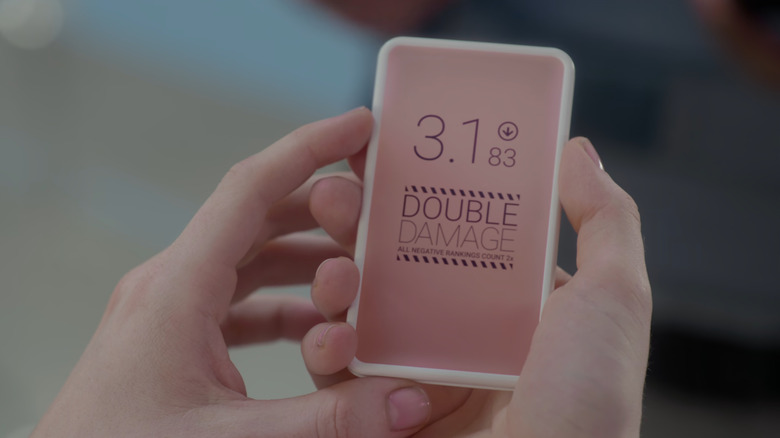This Black Mirror Episode Almost Changed Instagram Forever
In 2016, "Black Mirror" took on social media with its season 3 premiere, "Nosedive." It was all about a digital social rating system, but it was really about Instagram. At least, that's how some fans looked at it. From the pastel color scheme, to the way Lacie takes pictures of her food before eating, to how nearly every single character puts on a perfect, happy facade — it all feels like a skewering of Instagram, and the Instagram CEO may have taken note.
As the New York Times reported in 2020, Instagram CEO Adam Mosseri really wanted to get rid of public likes on the platform. The idea was that you'd be able to see how many likes your own post got, but you wouldn't see the tallies on other people's posts, so you wouldn't be constantly comparing yourself to the more popular users on the platform. This would potentially reduce feelings of envy and prevent its users from becoming too addicted to likes and digital approval. What inspired this decision of Mosseri's? Well, per the NYT, "Nosedive" played a role:
"[Mosseri] kept thinking about an episode of 'Black Mirror,' the British dystopian anthology series, in which the characters rate everyone they interact with on a scale of 1 to 5 stars. (It doesn't end well.) Mr. Mosseri knows something about dealing with dystopian tech fallout. He came to Instagram in October 2018 after years overseeing the Facebook News Feed, an unwitting engine of fake news, inflammatory rhetoric and disinformation. He wants to avoid similar pitfalls at Instagram, which is owned by Facebook."
Did Mosseri succeed in his quest to de-'Black Mirror' Instagram? No.
But as most Instagram users can attest after scrolling through the app for a few minutes in 2025, Mosseri did not manage to make likes private in the end. Not only can you still see how many likes each post and comment receives, but if you like a post, all your friends will be able to see it too. Instagram and Facebook (and now Threads) are also widely criticized for their manipulative algorithms and their many privacy violations. By this point, Instagram is sort of a dystopian cesspit, with its only real positive being that at least the likes on your post don't affect your credit score. (Well, not yet at least.)
Mosseri did get one thing accomplished: there is now an option in the settings for individual users to turn off the likes and share counts on their feed. Admittedly, making this setting optional sort of kills a lot of its appeal: those with likes off must deal with feeling out of the know with their peers over what's popular or not. Meanwhile, many users view turning public likes off as a sign of insecurity. That's why, as of 2021 at least, less than 3% of Instagram users have chosen to make their likes public.
It's hard not to wonder what Mosseri thinks about the season 5 "Black Mirror" episode, "Smithereens," which is sort of a spiritual sequel to "Nosedive." Whereas "Nosedive" was about an evil social media app, "Smithereens" heavily featured a depressed CEO character, Bill Bauer (played by Topher Grace), whose social media app had spiraled into something he no longer liked and could no longer fix. But at least both Bauer and Mosseri can comfort themselves with one saving grace: at least their app are not as bad as Twitter. (Sorry, I mean X.)

